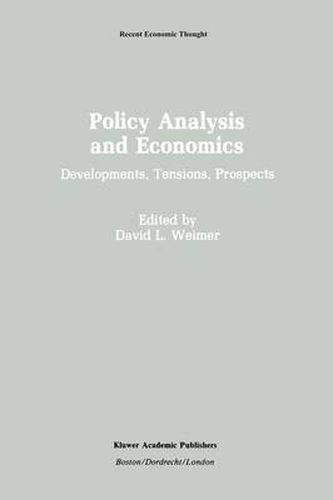Readings Newsletter
Become a Readings Member to make your shopping experience even easier.
Sign in or sign up for free!
You’re not far away from qualifying for FREE standard shipping within Australia
You’ve qualified for FREE standard shipping within Australia
The cart is loading…






This title is printed to order. This book may have been self-published. If so, we cannot guarantee the quality of the content. In the main most books will have gone through the editing process however some may not. We therefore suggest that you be aware of this before ordering this book. If in doubt check either the author or publisher’s details as we are unable to accept any returns unless they are faulty. Please contact us if you have any questions.
Long before policy analysis emerged as a separate profession with its own graduate schools, economists offered advice about government policies. Positive economics provides the tools for predicting the impacts of prop osed policies; normative economics, especially welfare theory, offers a framework for valuing the impacts of policies in terms of efficiency and simple notions of equity. With the expansion of economic theory into ever wider fields of human behavior, it is no wonder that economists have prominence as teachers and practitioners of policy analysis. Indeed, many economists see policy analysis as essentially applied economics. Though other social scientists might object to this somewhat parochial view, economics and policy analysis share much in commom in terms of develop ment and prospects. The purpose of this volume is to trace these interrela tionships and explore the tensions that they create. Tensions arise for several reasons. Changes in the discipline of econ omics affect the findings, methods, and personnel offered to policy analy sis. For example, on the one hand, the new institutional economics appears to be extending the influence of economists to questions involving nonmarket oranizations, while on the other hand, the apparently growing emphasis within the economics profession on creating rather than empir ically testing theory suggests that fewer of the best young scholars will be drawn to policy-relevant research. Within the schools of policy analysis, the drift toward public management may reduce the demand for traditional economic training.
$9.00 standard shipping within Australia
FREE standard shipping within Australia for orders over $100.00
Express & International shipping calculated at checkout
This title is printed to order. This book may have been self-published. If so, we cannot guarantee the quality of the content. In the main most books will have gone through the editing process however some may not. We therefore suggest that you be aware of this before ordering this book. If in doubt check either the author or publisher’s details as we are unable to accept any returns unless they are faulty. Please contact us if you have any questions.
Long before policy analysis emerged as a separate profession with its own graduate schools, economists offered advice about government policies. Positive economics provides the tools for predicting the impacts of prop osed policies; normative economics, especially welfare theory, offers a framework for valuing the impacts of policies in terms of efficiency and simple notions of equity. With the expansion of economic theory into ever wider fields of human behavior, it is no wonder that economists have prominence as teachers and practitioners of policy analysis. Indeed, many economists see policy analysis as essentially applied economics. Though other social scientists might object to this somewhat parochial view, economics and policy analysis share much in commom in terms of develop ment and prospects. The purpose of this volume is to trace these interrela tionships and explore the tensions that they create. Tensions arise for several reasons. Changes in the discipline of econ omics affect the findings, methods, and personnel offered to policy analy sis. For example, on the one hand, the new institutional economics appears to be extending the influence of economists to questions involving nonmarket oranizations, while on the other hand, the apparently growing emphasis within the economics profession on creating rather than empir ically testing theory suggests that fewer of the best young scholars will be drawn to policy-relevant research. Within the schools of policy analysis, the drift toward public management may reduce the demand for traditional economic training.